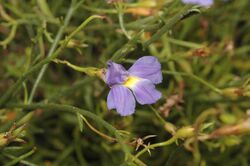Biology:Goodenia coerulea
| Goodenia coerulea | |
|---|---|

| |
| In the Australian National Botanic Gardens | |
| Scientific classification | |
| Kingdom: | Plantae |
| Clade: | Tracheophytes |
| Clade: | Angiosperms |
| Clade: | Eudicots |
| Clade: | Asterids |
| Order: | Asterales |
| Family: | Goodeniaceae |
| Genus: | Goodenia |
| Species: | G. coerulea
|
| Binomial name | |
| Goodenia coerulea R.Br.[1]
| |
| Synonyms[1] | |
| |
Goodenia coerulea is a species of flowering plant in the family Goodeniaceae and is endemic to the south-west of Western Australia. It is an erect, perennial shrub or biennial herb shrub with linear leaves at the base of the plant, sometimes with a few teeth on the edges, racemes of blue flowers and oval fruit.
Description
Goodenia coerulea is an erect, ascending shrub or biennial herb that typically grows to a height of 40–50 cm (16–20 in) with foliage covered with glandular hairs. The leaves are linear, 30–70 mm (1.2–2.8 in) long, 1–3 mm (0.039–0.118 in) wide and sessile. The flowers are arranged in racemes mostly up to 300 mm (12 in) long on a peduncle 10–25 mm (0.39–0.98 in) long with small, leaf-like bracteoles 2–5 mm (0.079–0.197 in) long at the base, each flower on a hairy pedicel 5–20 mm (0.20–0.79 in) long. The sepals are linear to lance-shaped, 3–7 mm (0.12–0.28 in) long and the petals blue and 15–25 mm (0.59–0.98 in) long. The lower lobes of the corolla are 5–10 mm (0.20–0.39 in) long with wings about 2 mm (0.079 in) wide. Flowering occurs from September to January and the fruit is an oval capsule 7–8 mm (0.28–0.31 in) long.[2][3]
Taxonomy and naming
Goodenia coerulea was first formally described in 1810 by Robert Brown in Prodromus Florae Novae Hollandiae et Insulae Van Diemen.[4][5] The specific epithet (coerulea) means "deep sky-blue".[6] (The epithet has sometimes been given as caerulea, but Brown's original spelling was coerulea.)[1]
Distribution and habitat
This goodenia grows in a variety of habitats and is widely distributed from near Shark Bay the south coast in the south-west of Western Australia.[2][3]
Conservation status
Goodenia coerulea is classified as "not threatened" by the Western Australian Government Department of Parks and Wildlife.[3]
References
- ↑ 1.0 1.1 1.2 "Goodenia coerulea". Australian Plant Census. https://biodiversity.org.au/nsl/services/apc-format/display/1095971.
- ↑ 2.0 2.1 Carolin, Roger C.. "Goodenia caerulea". Australian Biological Resources Study, Department of Agriculture, Water and the Environment: Canberra. https://profiles.ala.org.au/opus/foa/profile/Goodenia%20caerulea.
- ↑ 3.0 3.1 3.2 "Goodenia coerulea". FloraBase. Western Australian Government Department of Parks and Wildlife. https://florabase.dpaw.wa.gov.au/browse/profile/29362.
- ↑ "Goodenia coerulea". APNI. https://id.biodiversity.org.au/instance/apni/541082. Retrieved 6 January 2021.
- ↑ Brown, Robert (1810). Prodromus Florae Novae Hollandiae et Insulae Van Diemen. London. p. 578. https://www.biodiversitylibrary.org/item/21871#page/446/mode/1up. Retrieved 6 January 2021.
- ↑ Sharr, Francis Aubi; George, Alex (2019). Western Australian Plant Names and Their Meanings (3rd ed.). Kardinya, WA: Four Gables Press. pp. 304–305. ISBN 9780958034180.
Wikidata ☰ Q51050586 entry
 |
